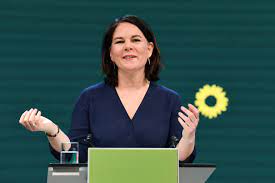Is green the new normal?
 These are heady days to be a German Green. Last month, Die Grünen chose 40-year-old Annalena Baerbock as their candidate for chancellor in September’s federal election. Since then there has been a huge influx of new members excited by the prospect of what is shaping up to be a generational shift in the country’s politics. According to the latest polls, the party is either fighting for first place with or is ahead of the Christian Democratic Union, which is mired in Covid-related difficulties, including a corruption scandal and dissatisfaction at the slow rollout of the vaccination programme.
These are heady days to be a German Green. Last month, Die Grünen chose 40-year-old Annalena Baerbock as their candidate for chancellor in September’s federal election. Since then there has been a huge influx of new members excited by the prospect of what is shaping up to be a generational shift in the country’s politics. According to the latest polls, the party is either fighting for first place with or is ahead of the Christian Democratic Union, which is mired in Covid-related difficulties, including a corruption scandal and dissatisfaction at the slow rollout of the vaccination programme.
There have been green awakenings in the past which proved ephemeral. In the wake of the Fukushima nuclear disaster 10 years ago, the party enjoyed a historic surge in support, only to slump disappointingly at the 2013 election. This time feels significantly different. The Greens already form part of coalition governments in 11 of Germany’s 16 states. Their poll ratings have comfortably eclipsed those of the centre-left Social Democrats over the past 12 months, and a pragmatic leadership has been careful to court the political mainstream on foreign policy issues such as commitment to Nato. One striking survey for a German business magazine found that more company executives preferred the idea of Ms Baerbock as the next chancellor to the 60-year-old Armin Laschet, the somewhat lacklustre CDU candidate.
It seems very likely, then, that the next German federal government will have an important Green component, and it may even be Green-led. The timing would make this a continental game-changer. Germany’s Greens have the potential to become the leading force in a rehabilitation of progressive politics in Europe, where centre-left parties have struggled to unite older blue-collar voters with younger generations who have grown up in the post-industrial era.
The Greens would commit Germany to a 70% reduction in domestic carbon emissions by 2030, up from the existing target of 55%. Such an upping of the ante, placing Germany in line with the Paris agreement goal of limiting global heating by 1.5C, is a gamble. The level of disruption would be considerable; according to some estimates, the accelerated drive to electric vehicles and growing automation will mean job losses. The areas most affected are likely to be German equivalents of the economically depressed regions that launched the French gilets jaunes protest movement. To promote a fair transition to a green economy, Ms Baerbock and her colleagues have promised a $500bn public spending programme and said they would abandon the so-called debt brake, a constitutional limit on government borrowing. A 50% boost to welfare payments would also be on the cards, along with a wealth tax.
This is highly ambitious stuff in a nation as fiscally conservative as Germany. But convincing electorates and markets that it can be done – and funding the meaningful regeneration of post-industrial regions - is the pivotal task now facing all progressive parties. The launch of Joe Biden’s $2.25tn green jobs plan sets a precedent that cash can be spent. In 2011, as Die Grünen leapt ahead in the polls, one magazine suggested that “green is the new black”, a play on the colour traditionally associated with the CDU. This time round, as the climate emergency sets the mainstream parameters of politics, the party’s supporters hope that, out of necessity, green can become the new normal.
You can return to the main Market News page, or press the Back button on your browser.

